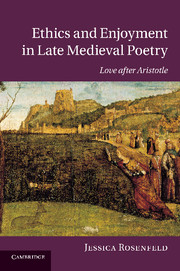Book contents
- Frontmatter
- Contents
- Acknowledgments
- Introduction: love after Aristotle
- 1 Enjoyment: a medieval history
- 2 Narcissus after Aristotle: love and ethics in Le Roman de la Rose
- 3 Metamorphoses of pleasure in the fourteenth-century dit amoureux
- 4 Love's knowledge: fabliau, allegory, and fourteenth-century anti-intellectualism
- 5 On human happiness: Dante, Chaucer, and the felicity of friendship
- Coda: Chaucer's philosophical women
- Notes
- Bibliography
- Index
- CAMBRIDGE STUDIES IN MEDIEVAL LITERATURE
2 - Narcissus after Aristotle: love and ethics in Le Roman de la Rose
Published online by Cambridge University Press: 04 February 2011
- Frontmatter
- Contents
- Acknowledgments
- Introduction: love after Aristotle
- 1 Enjoyment: a medieval history
- 2 Narcissus after Aristotle: love and ethics in Le Roman de la Rose
- 3 Metamorphoses of pleasure in the fourteenth-century dit amoureux
- 4 Love's knowledge: fabliau, allegory, and fourteenth-century anti-intellectualism
- 5 On human happiness: Dante, Chaucer, and the felicity of friendship
- Coda: Chaucer's philosophical women
- Notes
- Bibliography
- Index
- CAMBRIDGE STUDIES IN MEDIEVAL LITERATURE
Summary
Narcissus was always “after Aristotle,” as my chapter title seems unnecessarily to remind us, but the succession was reversed for the Latin Middle Ages, in which Ovid preceded the Philosopher by centuries, at least in terms of textual reception. There are any number of reasons why we might seek to find out what happens to Narcissus – Ovid's Narcissus along with his avatars, the self-reflexive, self-sacrificing protagonists of much love poetry – after Aristotle is fully returned to medieval discourse. Aristotle was, after all, no critic of self-love. In the thirteenth century, both philosophy and poetry grappled with shifting understandings of earthly and divine love, physical and intellectual pleasure, and human happiness. The Aristotelianism that came to dominate scholastic discourse in this period with the full translation and dissemination of most of the philosopher's works into Latin did not leave medieval understandings of love untouched. I concentrate below on the way that Aristotle's ethical writings transformed both poetic and philosophical understandings of love, taking as my focus the Roman de la Rose of Guillaume de Lorris and Jean de Meun. An examination of thirteenth-century Aristotelianism in this light will allow us to add another facet to our reading of Jean's transformation of Guillaume's Rose, to the poetic legacy of the conjoined text, and also to our understanding of the developing traditions of vernacular love poetry.
- Type
- Chapter
- Information
- Ethics and Enjoyment in Late Medieval PoetryLove after Aristotle, pp. 45 - 73Publisher: Cambridge University PressPrint publication year: 2010



